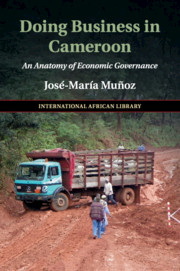
- Cited by 3
-
Cited byCrossref Citations
This Book has been cited by the following publications. This list is generated based on data provided by Crossref.
Ning, Rundong 2022. Bureaucratic valves: paperwork as a contested tool in the international transfer of the franc CFA in Congo-Brazzaville. Africa, Vol. 92, Issue. 4, p. 581.
Schubert, Jon 2022. Disrupted dreams of development: neoliberal efficiency and crisis in Angola. Africa, Vol. 92, Issue. 2, p. 171.
Lefort-Rieu, Claire 2024. Using forced migration to foster emergence? International aid and development policies in Cameroon. Journal of Refugee Studies, Vol. 37, Issue. 2, p. 454.
- Publisher:
- Cambridge University Press
- Online publication date:
- September 2018
- Print publication year:
- 2018
- Online ISBN:
- 9781108684477


